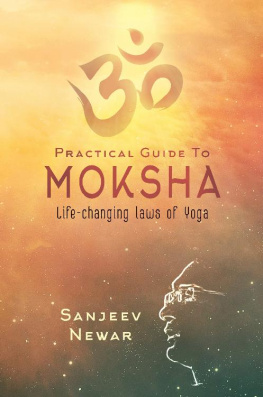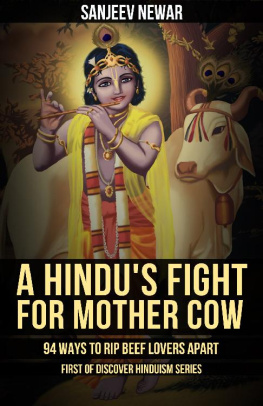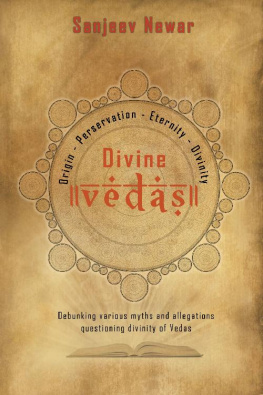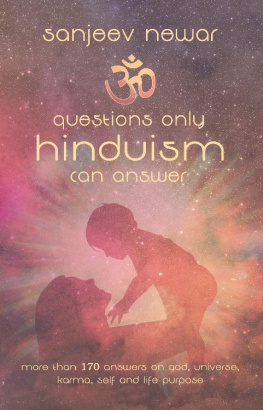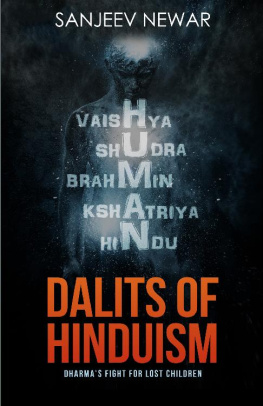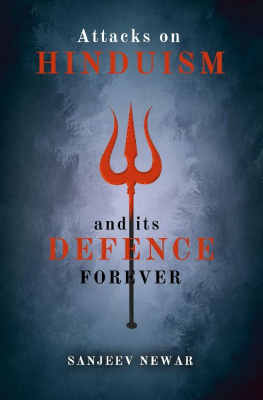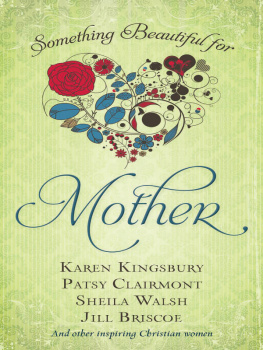
Practical Guide to Moksha
Life-changing laws of Yoga
Copyright 2017 by Agniveer
All rights reserved. This publication may not be reproduced, stored in a retrieval system, or transmitted in whole or in part, in any form or by any means, electronic, mechanical, photocopying, recording, or otherwise, without the prior written permission of Agniveer.
For information contact
books@agniveer.com
Book Design and Composition by Ronak Trivedi
First Edition: September 2017

Sanjeev Newar
OTHER BOOKS BY AUTHOR
The Science of Blissful Living
Essence of Vedas
Questions Only Hinduism Can Answer
Divine Vedas
A Hindu's Fight for Mother Cow
Attacks on Hinduism And its defence forever
Beyond Flesh there lies a human being
Dalits of Hinduism
Preface
This book is simply my love for mother. Intuitive, pure, and essential, without false embellishments, refreshing and most effective.
This book is original. None of the concepts presented is my creation. I have simply reproduced what was always there. Gita says, What exists cannot cease to exist. What does not exist cannot begin its existence. This book is merely a repackaging of eternal love of a mother that form the basis of the oldest philosophy known to humanity and every wonderful philosophy that shaped human civilisation.
This book is an attempt of the child to express the love of its mother. Words are merely tools. The presentation is merely a way to communicate in a way that modern era humans can understand. The essence, however, is as simple, as unchangeable, and as universal as the love of a mother.
Somewhere along the journey, it will become clearer who the mother is, what this love is and why this love is all that you need. I leave it to the audience to decipher all that. After all, identifying the mother is not that difficult! For a child, mother is everything. A mother is all it wants. You get mother and you get whatever you want. Nothing else surpasses mother.
Since childhood, I was kind of a hacker. I never knew about Pareto principle until college. But I knew that when there is an examination next morning, even a few hours are sufficient to complete the course work of the year. I was lucky to get this realisation much early in my life. I would focus only on the essence, relate with experiences of life and leave out the details that did not matter.
I realised that knowledge is best retained when it is brief and part of your emotions. A child knows how to love a mother long before it knows her name or even remembers every detail of her face.
This book contains life-changing laws of Yoga in as many less words as possible to help you connect with the mother. You will also get everything you want in life - success, wealth, happiness. You will get Moksha the ultimate victory.
How to read this book
If you are reading this book for the first time, please read cover to cover sequentially. The book continues to build upon concepts introduced earlier and uses a variety of methods to reprogram your conscious and subconscious mind to its legendary reality. These are most effective when read in order. Once you have read the book cover to cover at least once, you can then delve into any part of the book as per your choice.
Please note however that the book is neither a novel nor a textbook. Unlike most other books, it activates the dormant potentials of your mind and rekindles the wisdom that you already possess. It changes your thought habits while you read. Practice builds the habits. Use this book as a constant companion with whom you constantly practice your transformation. Each interaction with the book will bring significant transformation in you.
The book introduces a massive amount of thought shifts. Adjust your pace for best comprehension. Do not try to complete the book in one evening. I remind you, this is not a novel. Let the book grow inside you. Allow yourself to build upon earlier chapters gradually instead of losing the essence. Instead of hurrying to the end, enjoy the journey. Revisit earlier chapters if you feel so.
If possible, read the book first thing in the morning before the start of a new exciting day ahead. That would help you practice the concepts during the day. Annotate and mark the book with your own symbols and thoughts. Highlight, underline, and comment as much as you can. Make it a workbook instead of a textbook. Better still, make it an emotion-book.
As you progress, lots of changes will come in you. That is inevitable. People will notice and comment. You may become conscious about them. The habit of inertia makes us all resistant to changes. The comments may not be always encouraging as people are adjusted to the old you. Consider each comment as an encouragement to progress even further and even faster. Just enjoy the process of change.
See if you can form a group that is reading the book and mind-sharing. Each one of you must have your own copy as a personal friend. Dont share your copy of the book with anyone. Gift them a new copy. This is true for both digital and print versions. You all may read at a different pace but nonetheless take the time to sit and discuss the concepts of the book exclusively.
Become a champion of the book. Recommend it and gift it to as many as you can. I am not saying this to increase sales. I have a variety of other lucrative means to earn as much as I want. What happens when you champion the cause is that your mind is forced to embrace the concepts even more deeply. You obtain ownership of the transformation, and hence, it becomes permanent.
One thing you will notice about the book is how I shuffle between I and we. This may be distracting at times, but it is deliberate. The foundation of Yoga lies in expanding your petty I beyond your tiny body to the entire universe, seeing the I in everything. That is why Yoga means connection. Moksha means breaking free of petty I. In Yoga, I, we, you are all same. This expansion of I is so powerful that you will see its benefits immediately in life with a magnified intuition, unshakeable confidence, and winning attitude.
Dont ever share a free copy with anyone. That will fail the purpose. The book is nominally priced. When you purchase the book and encourage others, you encourage a worthwhile cause. You allow the law of Karma to multiply your own success. Else, you make yourself ineligible for ownership of transformation. Your progress remains a hollow bubble that can burst anytime.
Remember, the value extracted from the book is zillion times more than the petty price. Show your commitment, announce your commitment and get rewards of your commitment. The reward of a mother!
Once the book has worked its miracle on you, share your experience with us.
What this book can do for you
I promise that this book will open gates of success for you like never before. I promise that this book will make you enjoy life like never before. I promise that your personality will start having that X factor like never before. Your performance will improve, your doubts would melt away, your growth will speed up, you will become charismatic, you will have most amazing relationships in life, you will start attracting much more wealth, and most importantly you will have happiness like never before. Blah Blah Blah.
The similarities with other self-help or motivational books end with these promises. I go a step ahead and claim that this book will
Next page
